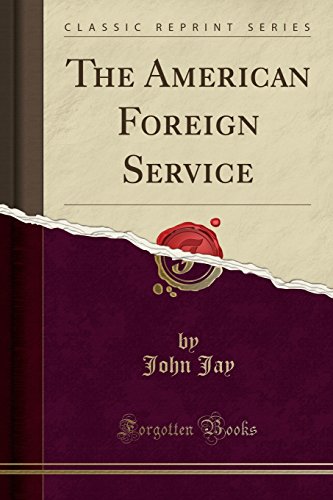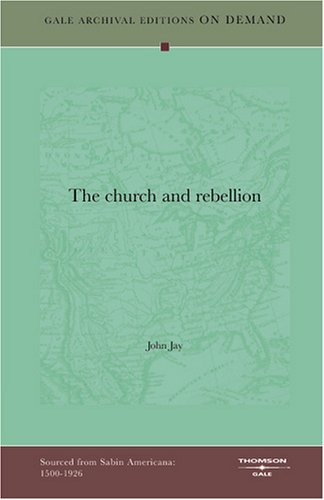Background
Jay was born on June 23, 1817, in New York City, the grandson of Chief Justice John Jay, and the only son who grew to maturity of Judge William Jay and Hannah Augusta (McVickar) Jay.



(Excerpt from The American Foreign Service It was followe...)
Excerpt from The American Foreign Service It was followed by the reappearance, in the War Department at Washington, of the same habit of taking moneys from the grantees of concessions which the commissioner of the State Department had illustrated and defended at the Austrian capital, and which the Government by its action had seemed to sanction and reward. When General Grant addressed to Congress his last annual message at the close of our Centennial year, the Presidential ques tion was still unsettled, and it seemed not improbable that the great party which had intrusted to his keeping the honor of the republic had been helplessly wrecked by the errors of his Administration. General Grant had been elected in 1868 by 214 electoral votes against 71 cast for Governor Seymour; and in 1876 that large major ity had vanished, and the fate of the party hung upon a single vote. About the Publisher Forgotten Books publishes hundreds of thousands of rare and classic books. Find more at www.forgottenbooks.com This book is a reproduction of an important historical work. Forgotten Books uses state-of-the-art technology to digitally reconstruct the work, preserving the original format whilst repairing imperfections present in the aged copy. In rare cases, an imperfection in the original, such as a blemish or missing page, may be replicated in our edition. We do, however, repair the vast majority of imperfections successfully; any imperfections that remain are intentionally left to preserve the state of such historical works.
https://www.amazon.com/American-Foreign-Service-Classic-Reprint/dp/1331114926?SubscriptionId=AKIAJRRWTH346WSPOAFQ&tag=prabook-20&linkCode=sp1&camp=2025&creative=165953&creativeASIN=1331114926

(The church and rebellion: Mr Jay's letter to the rector a...)
The church and rebellion: Mr Jay's letter to the rector and vestry of St Matthew's church Bedford with a preface in reply to the rector's speech from the chancel on Sunday June 21 1863 touching the recent visit of a clergyman of doubtful loyalty Gale Archival Editions: On Demand are digital copies of rare and out-of-print historical content. Delivered where and when you need them, Gale Archival Editions arrive complete with original fonts, marks, notations, punctuation and spelling, giving you the feeling of owning the original work. These images of original works?from the world's leading libraries?include everything from books to pamphlets, many with original illustrations, indexes, maps and other annotations. Sourced from Joseph Sabin's Bibliotheca Americana: A Dictionary of Books Relating to America from its Discovery to the Present Time (1868-1936), the Sabin American Civil War Collection includes thousands of titles on all topics related to the Civil War experience.
https://www.amazon.com/church-rebellion-John-Jay/dp/1432803921?SubscriptionId=AKIAJRRWTH346WSPOAFQ&tag=prabook-20&linkCode=sp1&camp=2025&creative=165953&creativeASIN=1432803921

(Excerpt from America Free or America Slave: An Address on...)
Excerpt from America Free or America Slave: An Address on the State of the Country, Delivered by John Jay, at Bedford, Westchester County, New York, October 8th, 1856 Mr. Fillmore, however, has referred his fel low-citizens to his past career as the guarantee of the course he will pursue if elected to the Presidency. Taking him at his word, let us see how far that career entitles him to the confidence of the country. About the Publisher Forgotten Books publishes hundreds of thousands of rare and classic books. Find more at www.forgottenbooks.com This book is a reproduction of an important historical work. Forgotten Books uses state-of-the-art technology to digitally reconstruct the work, preserving the original format whilst repairing imperfections present in the aged copy. In rare cases, an imperfection in the original, such as a blemish or missing page, may be replicated in our edition. We do, however, repair the vast majority of imperfections successfully; any imperfections that remain are intentionally left to preserve the state of such historical works.
https://www.amazon.com/America-Free-Slave-Delivered-Westchester/dp/1330759257?SubscriptionId=AKIAJRRWTH346WSPOAFQ&tag=prabook-20&linkCode=sp1&camp=2025&creative=165953&creativeASIN=1330759257
Jay was born on June 23, 1817, in New York City, the grandson of Chief Justice John Jay, and the only son who grew to maturity of Judge William Jay and Hannah Augusta (McVickar) Jay.
Prepared for college at Dr. Muhlenberg's Institute, Flushing, Queens, Jay was graduated from Columbia in 1836, studied law, and was admitted to the bar in 1839. While still a student in Columbia College he was manager of the New York Young Men's Antislavery Society.
Jay practiced in New York City for about twenty years. On the death of his father in 1858 he retired from practice to give the rest of his life to the care of the ancestral estate and to public service. Oppressed or suffering humanity everywhere had his sympathy. As a young lawyer Jay was particularly prominent in the seven-years struggle (1846-1853) to procure the admission of St. Philip's Church (Negro) to the Protestant Episcopal Convention. He served as secretary of the Irish Relief Committee during the potato famine in 1847.
After the enactment in 1850 of the Fugitive-Slave Law he acted as counsel for many black fugitives. At a mass meeting in the Broadway Tabernacle, January 30, 1854, he framed the resolutions that were adopted opposing the repeal of the Missouri Compromise. In the following year he was an enthusiastic leader in the organization of the new Republican party in New York State. He favored enlistment of the blacks in the Union army, the proclamation of emancipation, the organization of the Freedmen's Bureau, and the adoption of the Thirteenth Amendment. On the other hand, Jay showed a liberal attitude toward the defeated South in favoring an allotment in the National Cemetery at Antietam for fallen Confederate soldiers. As minister to Austria, 1869-1874, he had the difficult task of bringing order out of a calumniating chaos in connection with the United States Commission to the International Exhibition held in Vienna in 1873.
After his return he was appointed chairman of a commission to investigate the New York Custom House for the Treasury Department, he was vice-president of the Civil Service Reform Association of the State of New York, a member, 1884-1887, of the state Civil Service Commission, and one of the framers of the state's first civil-service law. A stout defender of the public schools, he assailed the Roman Catholic Church for its attempts "to overthrow our common school system, to tax the people for Romish schools where children will be bent like the twig, moulded in the confessional, educated as subjects of the Pope, owing to him their chief allegiance. ". In his presidential address before the American Historical Association (1890), he maintained that the only sure guarantee of America's continued greatness was that every teacher in the common schools should be well grounded in American history. That Jay was well grounded himself is evidenced in all of his writings, especially in an excellent piece of historical research, The Peace Negotiations of 1782 and 1783, published by the New-York Historical Society in 1884, and under slightly different titles as a chapter in Volume VII of Justin Winsor's Narrative and Critical History of America (1888) and in Papers of the American Historical Association, vol. III (1888). In November 1877 he contributed "Motley's Appeal to History" to the International Review, an article which precipitated a controversy by its criticism of Grant's administration. Jay died on May 5, 1894, in New York City.
(Excerpt from The American Foreign Service It was followe...)
(The church and rebellion: Mr Jay's letter to the rector a...)
(Excerpt from America Free or America Slave: An Address on...)
Jay served as President of the Union League Club (1866, 1877), President of the Huguenot Society of America (1883-1894); he was also the founder of the American Geographical and Statistical Society (1852), a member of the New-York Historical Society, a member of the Metropolitan Museum of Art, and a member of the National Academy of Design.
Jay married, June 23, 1837, Eleanor Kingsland Field, of New York City.
